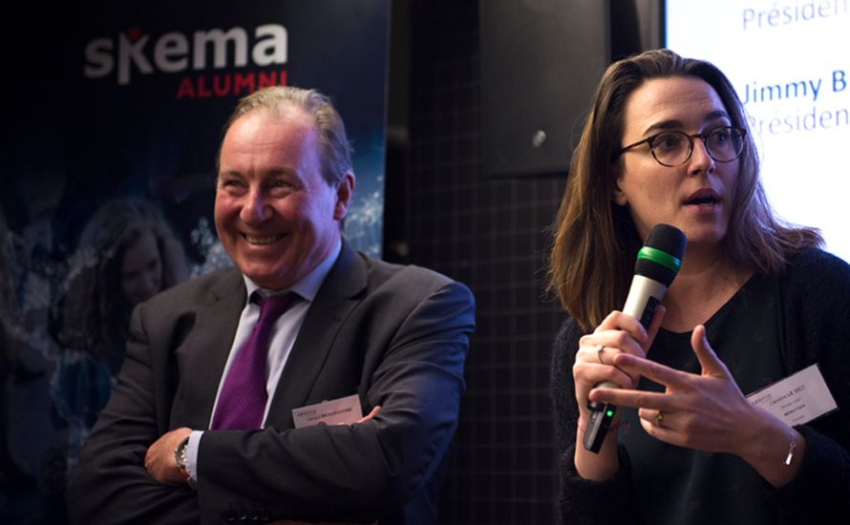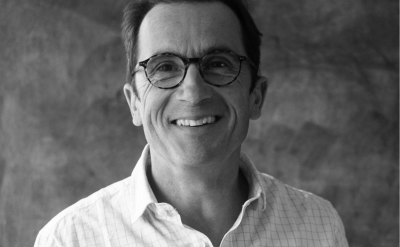News

Caroline Le Biez (SK 2007), Founder of Wenextgen and president of the SOFIA family council!
Family business, family council, cooperation between shareholders... these are just some of the concepts Caroline talked about during the SKEMA Alumni Lille Entrepreneurs’ Club round-table held on 5 March 2019 at Euratechnologies, with special guests G. Meauxsoone, CEO of Cafés MEO, and J. Bils, CEO of Bils-Deroo.
Caroline, can you tell us a bit about your time at SKEMA? Did being exposed to the world of family-owned businesses early on influence your career direction and your first positions?
When I began studying law, I wanted to be a lawyer and back then the idea of one day working in the family business was inconceivable, because I felt the business had too great an influence on the family. Then I decided to enrol in SKEMA’s MS Corporate Fiscal Management programme, convinced that this training would, in any case, be a plus later on if I ended up working in the family business.
After graduating, the first opportunity I got offered was to join the family office of the Mulliez family. And the fact that it was a family business played a big part in swaying my decision, since our business was also in the distribution sector and this business model was a real benchmark.
You’ve been the administrator of Groupe SOFIA (Société Financière Atlantic) since 2012 and you were appointed president of the family council in the last few days. Can you call us more about the group’s business activities?
Our group is established in Saint-Nazaire, where there is lot of industrial activity due to the presence of Airbus and some shipyards. It was founded by my grandfather who, after working overseas for a long time at the CFAO (Compagnie Française Afrique de l’Ouest), decided to return to his birthplace, Saint-Nazaire, in 1970. There he joined a company called Fers et Métaux de l’Ouest, as Director. On 15 January 1971 he founded a company called Atlantic Distribution, a subsidiary of FMO, where he became Chairman of the Board. This company distributes industrial supplies (for heating and plumbing) and petroleum products, and this activity still exists today. My grandfather gave up his active role a few years ago.
For the last 47 years the company has been expanding in related trade and has forged strong ties with the major leading retail chains and with partners of choice such as Butagaz, Camping Gaz, Leroy Merlin, Jardiland and Georg Fischer. The company is headed by my father, Jean-François Le Biez, as CEO, and Philippe Lefauconnier, as COO.
You got involved in the company by taking charge of something called “Affectio”. What does this mean?
Two years ago we noticed that the third generation had had very little involvement in decision-making, in discussions regarding the wealth management strategy, and that certain “branches” of shareholders took no interest in the company.
Once we’d realised this, we became convinced that we had to do something about it. My experience at AFM (Association Familiale Mulliez) had proven to me that it was possible to unite shareholders around a common goal, by shaking up this community and showing them the benefits there are in banding together.
To start with, we established a family charter. Then we began to organise company-related family events to rebuild relationships between the family members. The final step, which we are taking as we speak, is the creation of a family assembly and a family council, in charge of overseeing the family strategy. This oversight is called “Affectio” in French, in reference to “affectio societatis”, which describes a common desire shared by several legal or natural persons to merge into one entity and share its profits and losses. It is a key characteristic of a company under French law.
We know that bringing together shareholders that have drifted away and/or apart will take us a few years, but we are convinced that doing so is key to ensuring the long life of our family business.
You founded WENEXTGEN in 2018 to advise family entrepreneurs. Can you tell us more?
I created the WENEXTGEN podcasts after realising that many “nextgen” members of family businesses question themselves about their place, their role, their legitimacy. I’ve asked myself these same questions and finding suitable answers was difficult.
So in late 2018 I started interviewing some next-generation family entrepreneurs, to get them to share their own story and tell us where they fit in to this sphere. The goal is simple: listen to the experiences of other family entrepreneurs to feel less alone, to identify with what they have to say, and to better communicate and come to grips with any fears.
At the same time, I’m working on a second project (magouvernance.com / website still under construction), which consists in connecting independent administrators and companies via a digital platform to create strategic boards/governance structures that have high added value and are reinvigorated by the addition of current skills. This is a subject that is relevant to all companies, and family businesses are just one category. Many of them are encountering issues with skill within their governance bodies and now need to surround themselves with independent administrators and experts capable of assisting top management with the company’s future challenges.
What are the main problems encountered by these entrepreneurs? What solutions have been approved?
Right now, the two testimonials released as podcasts on Wenextgen (Céline Eloumou Zoa from Transports Mousset and Jessy Bachir from Glaces Bachir) are very positive. They encourage family shareholders to get actively involved in their governance so that others aren’t making decisions for them, and they show that when a family comes together, joins forces and its members cooperate with one another, the company wins.
What advice would you like to share with student- and alumni-entrepreneurs or with anyone considering taking over from the previous generation?
I don’t know if I’m really in a position to give advice. One thing is certain: before the new generation can take over, the previous one needs to be willing to pass on the torch. It’s tough to do, because it requires selflessness and trust in the next generation.
But there are several ways to prepare for this:
- In this day and age, before considering joining the company, it is crucial to gain some experience of the working world elsewhere, outside of the family business. This experience will teach you the rules of the business world, structure, open-mindedness, and you’ll gain some credibility;
- Competence must be the first criterion for being in any position; it ensures peace of mind for everyone;
- Take an interest in what the company does, ask questions, ask for a minor role in the governance bodies to begin with, simply so you can listen actively and learn how a board works;
- Play an active role as a shareholder by attending general meetings. For this, it’s important for previous generations to think about transferring a small portion of their shares, at least as bare ownership. Along with a small portion of full-ownership shares, as this very quickly develops the shareholder’s entrepreneurial wealth creation mindset. This is just my personal opinion, but I tend to believe that being paid a dividend, even if it’s very small, can help motivate the younger generations. The goal is not to establish a system of unearned income for the new generation, but simply to develop their awareness of how wealth management works and how important it is to protect it and keep it long term.
How would you go about motivating or at least teaching the new generation about the business?
You have to be creative to get away from simply presenting the yearly figures. There are several ways to spark interest from the new generations: by having them visit the company’s premises from an angle that appeals to them, by organising meetings with operational staff, by letting them organise company-related family events. Some companies even delegate to the next generation the responsibility of drafting the family charter, while others let them set up a company within the company as an intrapreneurial venture, or introduce a system to provide support with starting a business.
![]() Caroline Le Biez, Founder of WENEXTGEN
Caroline Le Biez, Founder of WENEXTGEN
If you are an entrepreneur or interested in launching an entrepreneurial venture, join the SKEMA Alumni Entrepreneurs’ Club Facebook group!
Find all the industry-specific clubs here!




